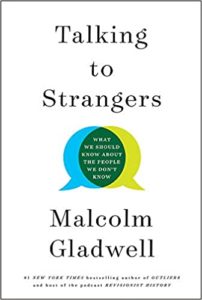 I admit that I am easily drawn to the words of Malcolm Gladwell, having already absorbed his The Tipping Point (2002), Blink (2007), and Outliers (2011). I was not disappointed!.
I admit that I am easily drawn to the words of Malcolm Gladwell, having already absorbed his The Tipping Point (2002), Blink (2007), and Outliers (2011). I was not disappointed!.
This is yet another intriguing and challenging mental exercise about the way in which our brains tend to mislead us,
Consider meeting someone new and engaging in conversation: afterwards, we think we have understood each other, but have we really?
Gladwell cites many past meetings that have resulted in gross misunderstanding: Cortes and Montezuma; Hitler and Chamberlain; Sandra Bland and the Italian police; Bernie Madoff and investors;, Sandusky and the Penn State authorities.
He suggests the fallacy lies in “… the assumption that we all follow in our own effort to make sense of strangers. We believe that the information gathered from a personal interaction is uniquely valuable.”
It is our instinctive desire to believe what a stranger tells us: our latent bias to trust what we hear. But the emotional responses to others can be and often are misleading. Gladwell says, “We tend to judge people’s honesty based on their demeanor.” Hesitancy, looking away, stammering, all lead us to doubt, but even those traits are misleading.
We are inevitably a species, “a society (that) does not know how to talk to strangers.” When we look differently, act differently, dress differently, we create instinctive wariness, alarm and natural aversion. When the stranger looks, acts, dresses and sounds like us, our natural sympathies are aroused.
Gladwell’s conclusion? Misunderstandings are entirely natural. “We will never know the whole truth,” so “… what is required of us is constraint and humility.”
So take heed … listen; pause, and think!
Editor’s Note: ‘Talking to Strangers’ by Malcolm Gladwell is published by LittleBrown, New York 2020.

About the Author: Felix Kloman is a sailor, rower, husband, father, grandfather, retired management consultant and, above all, a curious reader and writer. He’s explored how we as human beings and organizations respond to ever-present uncertainty in two books, ‘Mumpsimus Revisited’ (2005) and ‘The Fantods of Risk’ (2008).
A 20-year resident of Lyme, Conn., he now writes book reviews, mostly of non-fiction, a subject which explores our minds, our behavior, our politics and our history. But he does throw in a novel here and there.
For more than 50 years, he’s put together the 17 syllables that comprise haiku, the traditional Japanese poetry, and now serves as the self-appointed “poet laureate” of Ashlawn Farm Coffee, where he may be seen on Friday mornings. His late wife, Ann, was also a writer, but of mystery novels, all of which begin in a village in midcoast Maine, strangely reminiscent of the town she and her husband visited every summer.